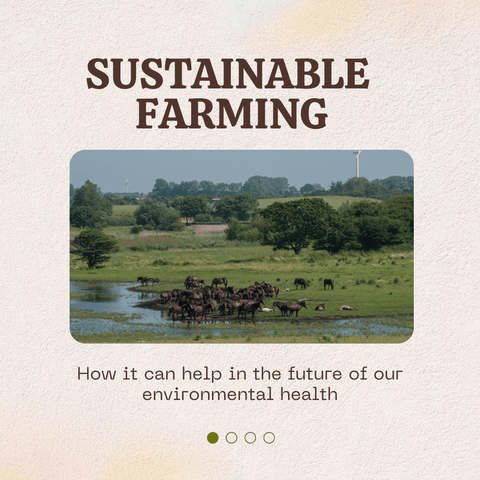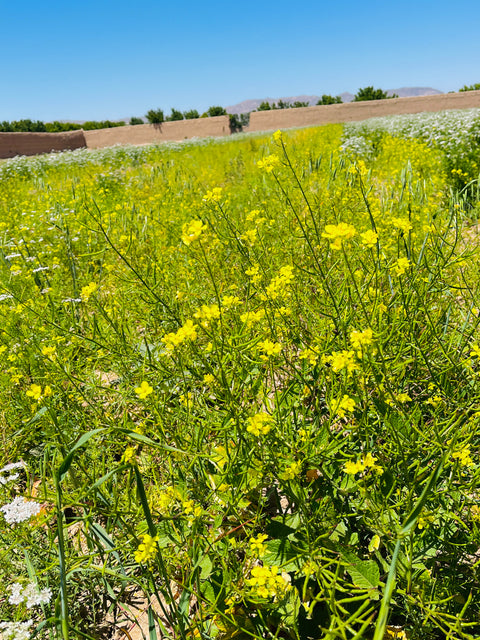There are numerous articles and discussions about sustainability and sustainable farming nowadays. Let's begin by understanding what sustainability means, and then delve into the practices of sustainable farming and supporting sustainable businesses as global citizens.
What is Sustainability?
Sustainability refers to the ability to maintain or sustain something over time, without depleting or damaging the resources on which it depends. In the context of the environment, sustainability means using resources in a way that does not compromise the ability of future generations to meet their own needs.
Sustainability involves balancing social, economic, and environmental considerations to ensure that development and progress are sustainable in the long term. This can include reducing greenhouse gas emissions, protecting biodiversity, conserving natural resources such as water and land, and promoting social equity and economic prosperity.
Sustainability is becoming increasingly important as the world's population grows, and as the impacts of climate change and environmental degradation become more severe. Many individuals, businesses, and governments are working to promote sustainability through initiatives such as renewable energy development, waste reduction, sustainable agriculture, and green building practices.

What Is Sustainability Farming?
Sustainable farming, also known as sustainable agriculture, is a farming system that aims to produce food in an environmentally friendly and socially responsible way, while also promoting the long-term viability of the farm and surrounding ecosystem. It involves practices that minimize the use of synthetic fertilizers, pesticides, and other harmful chemicals, and instead rely on natural, renewable resources such as crop rotation, cover cropping, and integrated pest management.
Sustainable farming also involves careful management of soil health, water resources, and biodiversity. This can include practices such as conservation tillage, precision irrigation, and the planting of native vegetation to provide habitat for beneficial insects and other wildlife.
In addition to environmental benefits, sustainable farming can also promote social and economic sustainability by supporting local communities, improving working conditions for farm workers, and promoting fair trade practices.
What Are Some Good Practices of Sustainability Farming?
Here are some good practices of sustainable farming:
- Crop Rotation: Planting different crops in the same field in a planned sequence can help to replenish soil nutrients, control pests and diseases, and reduce soil erosion.
- Cover Cropping: Planting crops like legumes or grasses in between the main crops can help to maintain soil fertility and health, reduce soil erosion, and suppress weed growth.
- Integrated Pest Management (IPM): This involves using a variety of methods to control pests, including biological control, crop rotation, and the use of natural pest predators.
- Precision Irrigation: Using advanced irrigation techniques like drip irrigation, which delivers water directly to the plant roots, can help to reduce water usage and prevent overwatering.
- Conservation Tillage: Reducing tillage can help to conserve soil moisture, increase organic matter, and reduce soil erosion.
- Agroforestry: Combining trees and crops in the same field can help to improve soil health, conserve water, and increase biodiversity.
- Use of Renewable Energy: Using renewable energy sources like solar or wind power can help to reduce greenhouse gas emissions and promote sustainability.
- Composting: Recycling plant and animal waste through composting can help to reduce waste, improve soil health, and increase fertility.
- Conservation of Biodiversity: Planting native plants, conserving natural habitats, and reducing pesticide use can help to promote biodiversity and ecosystem health.
By implementing these practices, sustainable farmers can help to reduce the environmental impact of agriculture, while also promoting long-term viability and profitability.

What Are Some Sustainability Farming Practices We Do in Heray Spice Farms at the Moment & Planning to Do in the Future?
Here are several sustainable farming practices that we currenlty do or planning to do in a near future:
- Conservation Agriculture: This approach involves reducing tillage, promoting crop rotation, and using cover crops to conserve soil moisture and reduce soil erosion.
- Agroforestry: Combining trees and crops can help to improve soil health, conserve water, and increase biodiversity.
- Integrated Pest Management (IPM): This involves using a variety of methods to control pests, including biological control, crop rotation, and the use of natural pest predators.
- Water Harvesting: Capturing and storing rainwater can help to provide irrigation water during the dry season, while also reducing soil erosion.
- Organic Farming: Avoiding the use of synthetic fertilizers and pesticides can help to reduce soil and water pollution, while also improving soil health.
- Livestock Management: Encouraging sustainable grazing practices, providing veterinary care, and improving animal nutrition can help to promote sustainable livestock production.
- Seed Saving: Saving and using local seeds can help to promote crop diversity, preserve local plant varieties, and reduce dependence on imported seeds.
By implementing these practices, farmers in Afghanistan help to improve food security, reduce the environmental impact of agriculture, and promote long-term sustainability in the region. However, it is important to note that the specific practices that are most appropriate will depend on local conditions, including soil type, climate, and available resources.

How Can Anyone Support Sustainable Businesses As a Global Citizen?
There are several ways that individuals can support sustainable businesses as global citizens:
-
Do your research: Before making a purchase, do some research on the company's sustainability practices. Look for businesses that prioritize environmental and social responsibility.
-
Choose sustainable products: Look for products that are made from sustainable materials, are energy-efficient, and have minimal environmental impact.
-
Reduce waste: Support businesses that promote zero-waste practices, such as reducing packaging waste, offering reusable containers, and recycling programs.
-
Support local businesses: Support businesses in your local community that prioritize sustainability and reduce carbon emissions by reducing transportation needs.
-
Advocate for change: Use your voice to advocate for change and support policies that promote sustainability, such as renewable energy and carbon reduction measures.
-
Vote with your wallet: Support businesses that align with your values and prioritize sustainability. By choosing to spend your money with sustainable businesses, you are sending a message to other businesses and driving demand for sustainable products and practices.
By taking these actions, individuals can play a role in supporting sustainable businesses and driving positive change towards a more sustainable future.












